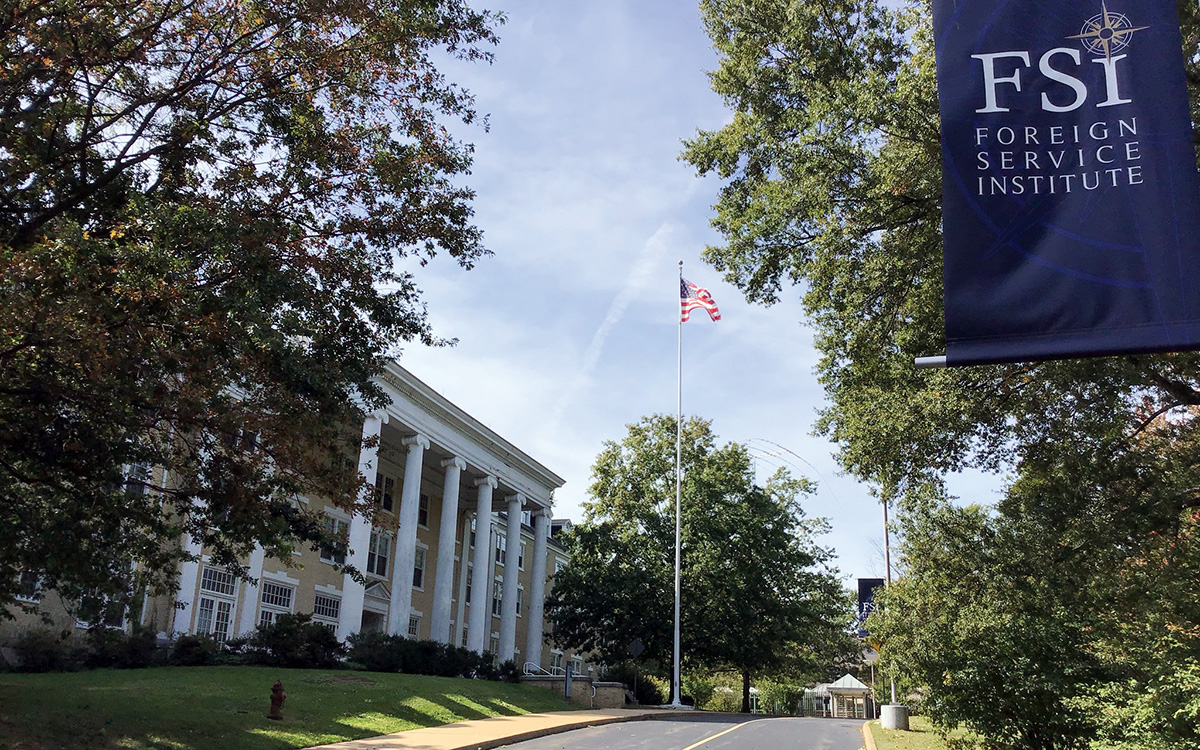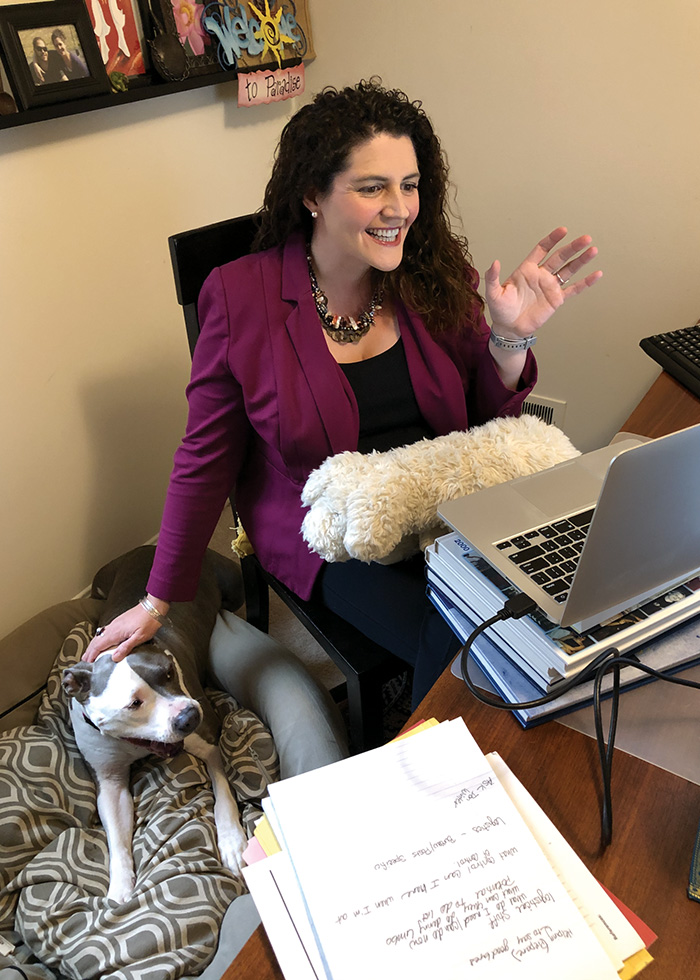How the Transition Center Expands Inclusion
Described as a “hidden gem” by this FSO, FSI’s Transition Center has a range of tools and services that are vital in helping build a more agile, inclusive Department of State.
BY MARYUM SAIFEE

The Transition Center, located in Building E at the National Foreign Affairs Training Center campus in Arlington, Virginia, is a vital part of the Foreign Service Institute.
U.S. Department of State / Vedran Andonovski

Laura Miller, the Transition Center’s division director of training, teleworking.
U.S. Department of State / Laura Miller
When I got my invitation letter to join the Foreign Service just over a decade ago, New York was collapsing into the abyss of a financial crisis and my transition to Washington was abrupt. I arrived feeling overwhelmed and out of place. My A-100 orientation class was large and relatively diverse. But when I look at who in my cohort has decided to leave the Foreign Service, I see it has been mostly women and people of color. The attrition in my class is emblematic of a larger picture portrayed in a recent Government Accountability Office report citing deep-rooted racial disparities that go back decades. For example, the number of Black women in the Foreign Service was at 2 percent in 2002. Fifteen years later, in 2017, the number had only risen to 3 percent.
I would have become another data point in the GAO’s mapping of our diversity exodus had it not been for a more flexible leave without pay (LWOP) policy that gave breathing space to State Department employees needing to push pause for a variety of life reasons. My previous overseas tours—Baghdad, Erbil, Lahore and Cairo, amid two evacuations—had taken a toll. The Foreign Service is an exhilarating career, but transitions become rockier as we rise up the ranks. And for women of color like me, there is the added complexity of navigating systemic racism and sexism, particularly when posted overseas where our credibility and competency are routinely questioned because we don’t look like “American” diplomats (read: white and male).
As Secretary Antony Blinken frames diversity as a national security imperative and a precondition to solving the complex challenges of the 21st century, the Foreign Service Institute’s Transition Center could be the department’s best kept secret in building this more agile and inclusive workforce. When I left a two-year LWOP to join the Transition Center’s team, I didn’t know very much about it. Like many Foreign Service officers, I knew FSI/TC offered a retirement course. And I vaguely remembered a resource center at FSI with blue boxes full of content to prepare for overseas assignments—but that was it.
Cultivating Life Skills as a Tool for Retention
Since joining FSI/TC earlier this year, I’ve discovered that the center is a hidden gem that hosts a broad range of programming that is fundamental to answering the Secretary’s call for retaining a diverse workforce. The Training Division’s Life Skills Unit equips the foreign affairs community with literacy on critical life skills ranging from personal finances and tax considerations in a foreign affairs context to employment opportunities for eligible family members, regulations and allowances when it comes to eldercare and parental leave, and so much more.
FSI/TC and the courses it offers are a reminder that Foreign Service and Civil Service professionals are more than worker bees churning policy, issuing visas or running operations at post: They are also multidimensional humans facing a host of life challenges, made all the more complex with transnational moves and caring for (and sometimes grieving the loss of) loved ones scattered across the world during a global shutdown.
Managing Expectations to Promote Agility
To help members of the foreign affairs community mentally prepare for an onward assignment, the Overseas Briefing Center has now migrated to a fully virtual “Post Info To Go” platform, with information that caters to the needs of diverse Foreign Service communities. Creating accessible, updated information from diverse lived experiences is essential to managing expectations and fostering resilience. To ensure that content resonates with all members of the foreign affairs community, OBC regularly solicits feedback from underrepresented groups. For example, the OBC team collaborated with the Bureau of Global Talent Management and the Disability Action Group, an employee resource group, to create a survey on accessibility options available within host nations. Elsewhere, OBC revamped the questions on its general survey to be more accommodating of singles. In a time of pandemic when post realities are changing by the day, Post Info To Go’s digital platform lends itself well to continually updating content to be timely, relevant and inclusive.
Investing in Institutional Resilience
A more recent addition to the FSI/TC family is the Center of Excellence in Foreign Affairs Resilience. CEFAR leads on-demand resilience programming for domestic offices and posts around the world. During the pandemic, CEFAR has reached more than 20,000 members of the international affairs community with webinars and customized trainings for offices and bureaus seeking to strengthen teams and boost performance. I took part in CEFAR’s four-part listening series on resilience customized for singles earlier this year. Resilience itself is a loaded term, so I approached the workshops with a bit of skepticism. As a woman of color, I’m often told to be more resilient in the face of institutional shortcomings and systemic failures.
These sessions were different. They focused on framing resilience (which includes cultivating a growth mindset, as well as fostering well-being) in both the institutional and individual contexts. After mining more than 1,000 comments from participants, CEFAR integrated the data into user-friendly infographics customized for the foreign affairs community. This included actionable tips for managers and the broader community to build a more singles-inclusive environment, as well as resilience resources for singles themselves. Follow-up also included a multibureau working group to discuss structural interventions, policy reform and ways to bring about sustainable culture change. For me, this series presented a useful model that could be piloted and potentially applied to other underrepresented groups, particularly those with high attrition.

Overseas Briefing Center Resource Specialist Maureen Johnston and Haris Kalajdzic, then a program assistant at the Transition Center.
U.S. Department of State / FSI / PA
Leveraging a Digital Transformation to Democratize Access to Knowledge
Over the last year, FSI rapidly transitioned almost entirely to virtual offerings. FSI/TC, particularly the Life Skills Unit, was already using digital courses before the pandemic, and we were able to innovate further by exposing students to new digital tools like Slido and Mural, as well as making available a compilation of recorded webinars. While there is no substitute for in-person interaction, and some courses will likely revert to meeting in person when it is again safe, the ability to offer courses in a digital format and make slides, toolkits and archived recordings available to participants helps democratize access to this vital knowledge for State Department employees, their families and the broader foreign affairs community.
Because of the courses I have been exposed to at the Transition Center as both an instructor and participant, I feel more equipped to handle some of the upheaval and uncertainty embedded in a Foreign Service career. Uprooting every few years, serving in compounds like Baghdad or Lahore where you are perpetually on high alert, or missing life milestones (weddings, reunions, funerals and so forth) can feel isolating and stressful. For example, had I taken the Regulations, Allowance, and Finances seminar—a course that went into exceptional detail on how to navigate an evacuation—earlier in my career, my two evacuations out of Egypt, in 2011 and again in 2013, would have been much smoother.
As Foreign Service officers, we are hardwired to put our personal lives on the back burner to serve the broader mission. However, this isn’t sustainable and ultimately leads to burnout. This is all the more acute for marginalized groups grappling with larger, systemic inequities. Secretary Blinken noted in recent remarks welcoming the State Department’s first-ever chief diversity and inclusion officer, Ambassador Gina Abercrombie-Winstanley, that diversity work “is not just the work of the CDIO—or any other individual with ‘diversity’ and ‘inclusion’ in their title. … It is the job of every single member of this department.”
FSI’s Transition Center touches every stage of one’s career life cycle and has the potential to not only lay the foundation for a more agile and inclusive workforce, but also create an enabling ecosystem where all employees can thrive, sustain their well-being and realize their full potential.
Read More...
- “Making Diversity and Inclusion Real in Foreign Affairs: Reports from the Affinity Groups,” The Foreign Service Journal, October 2020
- “Diversity: Not Just a Cause for the Underrepresented,” by Jay Porter, The Foreign Service Journal, September 2018
- “Diversity: The Mentoring Dimension,” by Jennifer Zimdahl Galt and Thao Anh Tran, The Foreign Service Journal, June 2015




